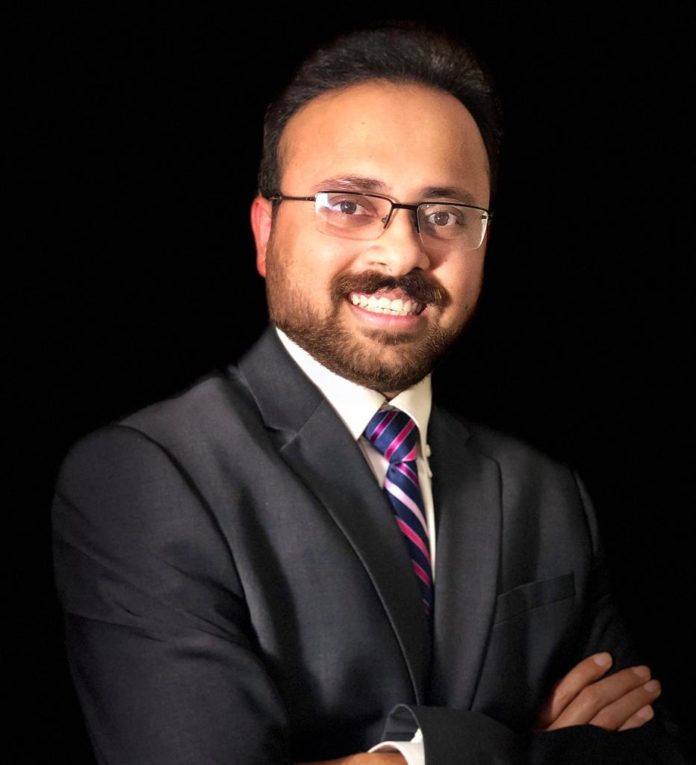Cardiac failure not always because of heart, the kidney also plays the spoilsport: Dr Singhania
By Faruque Ahamed,Kolkata:
Heart failure is a chronic silent disease. Nearly 10 million people are affected in India. Widespread societal ignorance regarding the detection of high blood pressure (hypertension) and usage and adherence to anti-hypertensive medications is a prominent cause of the global epidemic status of heart failure.
This chronic disease is a huge economic burden on any nation. We caught up with Dr. Girish Singhania, attending nephrologist and hospitalist at CHI St Vincent’s Infirmary, Little Rock in USA, to obtain his insights on the management of heart failure. Dr. Singhania’s paradigm in clinical investigative work has enhanced our understanding that the manifestation of heart failure may arise in a different organ other than the heart. Worsening kidney function may be the only sign of declining efficiency of the pump action of the heart.
We are living in triumphant era of very high-quality anti-hypertensive medications, which target specific pathways of comprehensive control of high blood pressure. One of these classes of medications is called RAAS (Renin Angiotensin Aldosterone System) inhibitors. Inhibitors of RAAS have emerged as a prominent class of anti-hypertensive medications, since the original discovery of the inhibitors in Brazilian pit viper (Bothrops jararaca) venom from the seminal work of Dr. Sergio Ferreira and Dr. Yeshwant Bakhle. The uses of RAAS inhibitors (ACEI and ARB’s) have revolutionized the treatment of high blood pressure and heart failure. However, in some patients with pre-existing renal artery disease or
renal parenchymal disease the use of this class of medication has been associated with the worsening of kidney function.
Throughout his distinguished career, Dr. Singhania, an alumnus of Maulana Azad Medical College (MAMC) in New Delhi and a Fellow of the American Society of Nephrology, has emphasized the role of high-quality blood pressure control and its impact on community health. He Singhania provided his insights on management of acute decompensated heart failure, currently a major cause of morbidity and frequent hospital readmissions.
Excerpts of the interview with Mr Faruque Ahamed of IBG News are given below:
Q. Can signs of heart failure arise from an organ other than the heart?
GS Yes, the symptoms of heart failure may not be in the heart. Signs of worsening renal function as diagnosed by laboratory abnormality can lead to extensive workup to rule out kidney disease but in patients with heart failure it could be only due to their worsening cardiac ailments causing the decreased blood supply to the kidneys. Deficit in perfusion of the different body organs can host the symptoms.
A review of multiple systems is the key to identify the decline in cardiac mechanical function early.Treating heart failure effectively can lead to an improvement in heart function.
Q Where are these patients managed?
GS Long term management requires frequent interfacing with the subjects. Sometimes, the symptoms worsen abruptly and may necessitate hospitalization. We meet out high-quality care in the hospital, the ICU and during rehabilitation, with an aim to prevent frequent readmissions, a common avenue for increasing costs of care.
Q Would these patients benefit from organ transplantation?
GS Long term management needs insightful use of medications, which can significantly delay progress of disease. Subjects with end-stage renal disease may need dialysis. There are a number of mechanical assist devices, which can ramp up heart function even at low ejection fractions. The highly compromised function shall definitely stand to benefit with cardiac transplantation. As you shall appreciate, these are highly complex patients and require coordination of care between different units in the hospital.
Advanced facilities are now available worldwide, and the standards of critical care are comparable between India and the United States.
Q How can we decrease the disease burden?
GS We should raise awareness on compliance with blood pressure medications and periodic assessment by one’s primary care physician (the “GP”). Diabetes is a significant contributor to heart disease, including cardiomyopathy and heart failure. Diabetes damages the kidneys significantly. High-quality control of diabetes is at the root of chronic management of heart failure. An aging society has increased the prevalence of the disease. Similarly, youth are also being affected. Stress, lack of exercise, smoking tobacco, and drugs of abuse are all contributory. We should make conscious efforts to continue informing the community on these critical issues.
This also shall have a significant impact on the costs of care. The direct cost of heart failure management is to the tune of 30 billion USD in the United States. Such significant numbers are also relevant in the context of the Indian healthcare scenario.
We should make every effort to dole out excellence in the management of one of the commonest chronic conditions affecting the current society. I remain focused on post-discharge care, which significantly prevents rehospitalization. Regular follow-up and community awareness about the disease is key.
Q Your work has provided a lead for disease biomarkers for hypertensive diseases. Could you please elaborate?
GS Serum uric acid measurement can provide us with important insights into the progression of hypertensive diseases, especially during pregnancy. Serum uric acid may be a marker for hypertensive disorders of pregnancy, namely preeclampsia. I am currently developing studies in this direction.
Q Your final comments Dr. Singhania.
GS The issues of optimal treatment for heart failure and worsening of renal function is often misunderstood. This should not be logic to withhold life-extending therapy. Deep clinical reasoning and a multi-disciplinary team involving hospitalists, nephrologists and cardiologists should carefully drive the decision of whom not to medicate after intense consideration of the clinical trajectory and balancing the risk benefits to the individualized patients. The treatment approaches should be taken on the scaffold of personalized medicine, such that the patient in need is not deprived of the survival benefits from the use of ACEI/ARB.






















